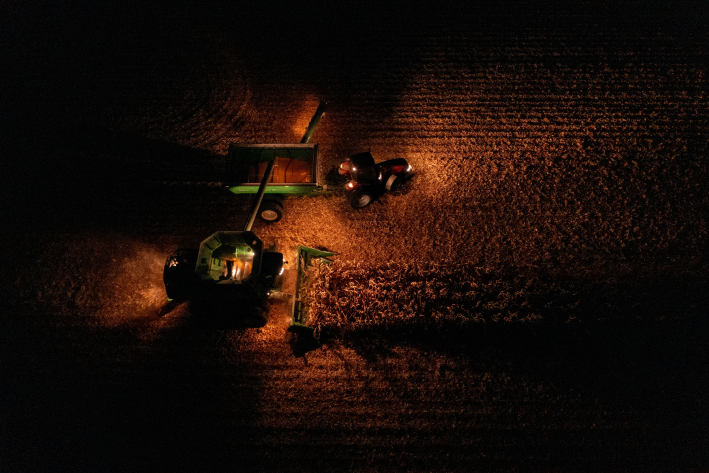
25/10/2024: The 2024 harvest in Germany was influenced by challenging weather conditions. While crops like winter wheat and fruit suffered losses, maize and potatoes achieved positive results. Summer crops and silage maize also showed good yields.
Agricultural production remains challenging caused by a year of weather extremes.

This year’s harvest in Germany was shaped by extreme weather conditions that significantly impacted various agricultural crops. While some yields saw a marked decline, there were positive outcomes for certain crops. The 2024 harvest thus reflects both the challenges and opportunities facing agriculture.
Winter wheat, Germany’s most important crop, recorded a harvest of 18 million tons in 2024, a 14.8% decline compared to the previous year. This was mainly due to the wet sowing conditions in the autumn of 2023 and a rainy summer that encouraged the spread of crop diseases. Particularly in North Rhine-Westphalia, yields fell by 13.2%, while Mecklenburg-Western Pomerania saw a slight increase of 5.5%.
Unlike winter wheat, summer crops such as spring wheat, spring barley, and oats delivered good yields this year. The acreage of these crops was significantly expanded in many regions to compensate for the shortfall in winter crops. Spring wheat recorded a harvest of 473,600 tons, nearly four times the amount of the previous year. The per-hectare yields of spring barley and oats were also significantly higher than in 2023.
Maize achieved a harvest of nearly 5 million tons in 2024, the best result in five years, representing a 9% increase compared to the previous year. Adequate rainfall in many regions, particularly in Lower Saxony and Saxony-Anhalt, supported plant growth. Only in eastern Germany did a dry spell cause slight losses.
Silage maize, including maize for corn cob mix, also showed positive growth in 2024. The cultivated area increased slightly to 2.06 million hectares (2023: 2.00 million hectares; 2022: 2.03 million hectares). Per-hectare yields this year reached 43.38 tons, up from 42.13 tons in the previous year. This increase is primarily attributed to the favorable rainfall in many regions that boosted plant growth.
The winter rapeseed harvest reached 3.6 million tons, slightly down from the previous year, but remained within the range of the multi-year average. The highly variable weather conditions caused regional fluctuations in yields, particularly in North Rhine-Westphalia and Lower Saxony. Despite the challenges, rapeseed remains an important crop for German agriculture.
Potato cultivation in 2024 saw a record harvest of 12.7 million tons, representing a 9% increase over the previous year. Despite delays in planting caused by excessive moisture in the spring, favorable growing conditions contributed to the strong yield. In Lower Saxony, the largest potato-growing region, the planted area was significantly expanded, contributing to the record harvest.
Fruit farmers experienced significant losses in 2024, mainly due to late frosts in April. The apple harvest is expected to amount to around 734,000 tons, 26.3% below the ten-year average. Other fruit crops, such as cherries and plums, also suffered from the frost damage.
The hops harvest in 2024 was a positive highlight, with around 49,000 tons, making Germany once again the world’s largest hops producer. Favorable weather conditions led to a slightly above-average yield, especially in Bavaria, strengthening Germany’s position in the global market.
The wine sector also faced significant losses in 2024. Late frosts and the wet summer months led to reduced yields in many growing regions, particularly in new vineyard plantings. Forecasts for the wine harvest are below average, which will pose further challenges for the industry.
The 2024 harvest demonstrated how weather conditions in Germany greatly impact agricultural production. While some crops, such as winter wheat and fruit, experienced significant losses, summer crops, maize, and potatoes achieved good yields. Silage maize also performed well with slight increases in acreage and per-hectare yields. Overall, farmers’ adaptability remains crucial for long-term success.
Do you have suggestions or questions about this article or topics related to agriculture, digitalization, AI, and AgTech? Feel free to send us an email at support@tunen.ai or drop us a message on Instagram or LinkedIn. We look forward to hearing from you.